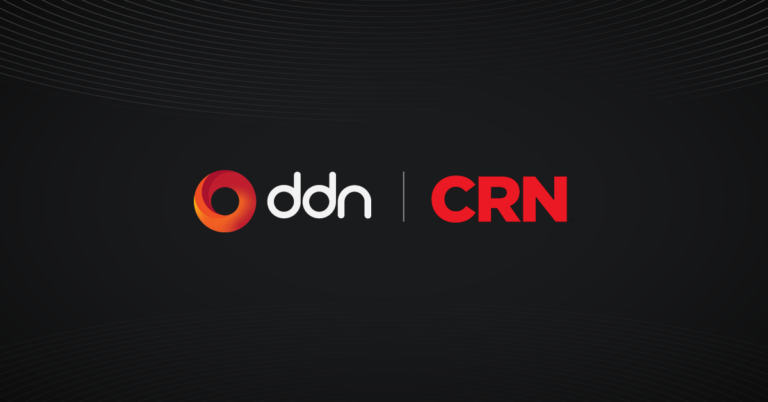Introduction
Life sciences is at the forefront of a digital transformation. With acceleration in genomics, biomedical imaging, and multi-omics, researchers are generating unprecedented volumes of data. At the same time, artificial intelligence (AI) is powering new discoveries in drug development, diagnostics, and personalized medicine. But as data volumes grow and AI models become more complex, the industry is running into a critical bottleneck: infrastructure that cannot keep up.
Traditional storage systems, designed for legacy HPC workloads, struggle to deliver the performance and flexibility required for modern AI pipelines. From genome sequencing and variant calling to AI-driven protein structure prediction, today’s life sciences workflows demand storage solutions that combine ultra-high throughput with intelligent, real-time data access. This has led to a growing need for AI-native infrastructure that bridges the gap between HPC and AI, and that’s exactly where DDN delivers.
The Infrastructure Bottleneck Slowing AI in Life Sciences
AI in life sciences depends on massive, multimodal datasets flowing seamlessly through every stage of research. But siloed legacy systems can’t meet the demands of today’s genomics, imaging, and molecular modeling workloads.
Genomic sequencing alone can generate petabytes of raw data. AI tools like AlphaFold2 and NVIDIA BioNeMo require ultra-low latency access to that data to predict structures or identify molecular interactions. Without the right AI data storage and orchestration, GPUs sit idle, and discoveries slow down.
To stay competitive, research institutions need to unify HPC performance with AI agility through an intelligent, scalable data platform.
Bridging HPC and AI with a Unified Data Intelligence Platform
DDN solves the infrastructure gap with a unified Data Intelligence Platform built on EXAScaler® and Infinia, purpose-built for AI and HPC in life sciences.
- EXAScaler® is DDN’s high-throughput, file-based platform designed for the most demanding workloads in genomics and HPC. It supports massive parallel processing, ensuring that large-scale variant calling, sequencing alignment, and population-wide studies can run at full performance, on-prem or in hybrid cloud environments.
- Infinia, on the other hand, serves as a next-generation object-based data platform engineered for AI inference, real-time analytics, and multi-modal data integration. It enables researchers to ingest, tag, query, and analyze structured and unstructured data at scale, while supporting the low-latency requirements of modern AI tools like NVIDIA NeMo, LLMs, and RAG pipelines.
Together, they form the intelligent infrastructure foundation needed to move from HPC to AI at scale.
Why HPC-Grade Storage Still Matters in Genomics and Bioinformatics
In life sciences, HPC remains critical, especially in genomics and bioinformatics. Applications like read alignment, variant detection, and de novo assembly push traditional file systems to their limits. EXAScaler® provides HPC-grade performance with extreme read/write throughput and high IOPS, optimized for the parallel I/O patterns common in genomics workflows.
It’s not just speed that matters—it’s also efficiency. By minimizing data movement and maximizing GPU utilization, EXAScaler® reduces idle time and accelerates compute workflows. For institutions working on national genome projects or large-scale population studies, this can translate to millions in operational cost savings and significantly faster time-to-insight.
Enabling Real-Time AI for Drug Discovery and Diagnostics
While EXAScaler® tackles the heavy lifting of HPC genomics, Infinia brings intelligence and flexibility to AI workflows. Built for metadata-rich, real-time environments, Infinia enables AI teams to run end-to-end pipelines for tasks such as:
- Protein structure prediction using AlphaFold2
- Drug candidate screening and molecular generation with BioNeMo
- AI model inference on large volumes of clinical, imaging, or omics data
Infinia integrates natively with AI frameworks, supports GPUDirect Storage, and delivers ultra-low latency data access. Compared to public cloud object stores, it offers up to 600x faster object listing and metadata search, significantly accelerating model training and inference cycles.
Infinia also supports hybrid deployments—allowing life sciences teams to operate seamlessly across multiple environments.
Real-World Impact: AI Infrastructure That Accelerates Discovery
Institutions using DDN’s AI infrastructure report measurable improvements:
- Faster time to discovery through real-time data ingestion and AI model training
- Improved model accuracy through unified access to multimodal datasets
- Reduced costs by maximizing GPU and compute efficiency
- Streamlined operations via automation, orchestration, and built-in observability
In one case, Infinia cut inference latency by over 40% for a leading genomics lab — enabling real-time molecular screening and eliminating months of manual data wrangling.
Trusted by Leaders in AI and Life Sciences
DDN powers over 500,000 GPUs globally and is trusted by industry leaders like NVIDIA, xAI, Scripps Health, and CINECA. Whether it’s accelerating AlphaFold deployments, enabling sovereign AI, or supporting next-generation genomics pipelines, DDN offers the scalability and performance needed to stay ahead in a rapidly evolving research landscape.
What makes DDN unique is its deep integration across the entire AI stack—from training to inference, data prep to analytics, and cloud to edge. The platform is hardware-agnostic, software-defined, and built for flexibility, so it grows as your needs grow.
The Future of Life Sciences Is Powered by Intelligent Infrastructure
As life sciences continues to embrace AI for everything from personalized medicine to vaccine development, the need for intelligent, scalable infrastructure becomes critical. AI and data must work together seamlessly delivering real-time insights, accelerating model accuracy, and enabling discovery at unprecedented scale.
DDN’s AI-native Data Intelligence Platform, powered by Infinia and EXAScaler®, offers the infrastructure backbone for the future of healthcare, genomics, and bioinformatics. It removes the complexity, slashes latency, and transforms raw data into actionable insightsfaster than ever before.
For organizations navigating the chaos of fragmented data and underperforming systems, the path to discovery starts with the right foundation.
Ready to Modernize Your Life Sciences Pipeline?
Explore how leading biotech and research organizations are transforming their AI workflows with DDN.
It refers to unifying traditional high-performance computing (HPC) with modern AI workflows for faster, more intelligent research and analysis.
By using EXAScaler® for ultra-fast data throughput and Infinia for intelligent data management, DDN eliminates latency and improves compute utilization in genomics workflows.
It’s a unified data infrastructure that integrates storage, analytics, and metadata to enable real-time AI training, inference, and data-driven research.
By accelerating AI-driven screening, structure prediction, and modeling — reducing time-to-market for new therapeutics.


